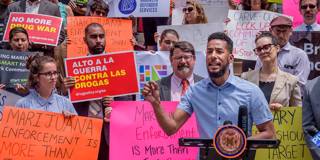With his evidence-based, public-health approach to drug policy, US President Joe Biden is signaling that America’s longstanding strategies of repression and punishment have failed. The US should also champion a similar shift toward harm-reduction policies internationally.
GENEVA – Fifty years ago this week, US President Richard Nixon declared that drug abuse was “public enemy number one” requiring a “tough on crime” approach in the United States and abroad. The “war on drugs,” which expanded in parallel with the global political, military, economic, and cultural hegemony of the US in the post-World War II decades, has delivered the exact opposite of its own stated aims. Today we have both plant-based and synthetic production; low-scale and high-level trafficking of illicit narcotics; disproportionate sentencing and over-incarceration; violence and rights violations; and money laundering and enrichment of organized crime – all strengthened, not weakened, by repressive responses to illegal drugs.

GENEVA – Fifty years ago this week, US President Richard Nixon declared that drug abuse was “public enemy number one” requiring a “tough on crime” approach in the United States and abroad. The “war on drugs,” which expanded in parallel with the global political, military, economic, and cultural hegemony of the US in the post-World War II decades, has delivered the exact opposite of its own stated aims. Today we have both plant-based and synthetic production; low-scale and high-level trafficking of illicit narcotics; disproportionate sentencing and over-incarceration; violence and rights violations; and money laundering and enrichment of organized crime – all strengthened, not weakened, by repressive responses to illegal drugs.